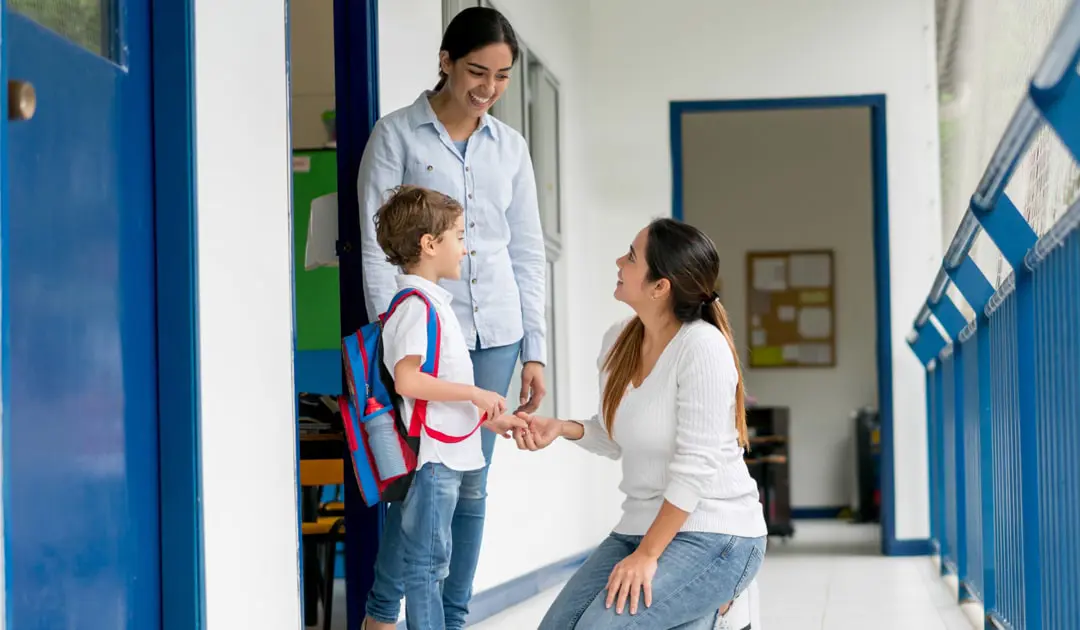Beyond the Student: How Educators Can Help Alleviate Parental Anxiety

Educators are keenly aware of the critical role they play in shaping children's futures. And we all know that responsibility extends far beyond lesson plans and homework as many—if not all—teachers also provide support to students who exhibit anxiety and challenging behaviors. Post-pandemic teaching environments are requiring educators to address more student anxiety and trauma than ever before, as students and teachers re-acclimate to in-person learning.
But it’s important to remember that parental anxiety around school transitions is normal too.
It’s instinctual for parents to want to protect and prevent their children from any sort of distress. And whether a child is attending school for the very first time, transitioning into a new school, or returning to in-person learning after being in a virtual home environment, there’s a myriad of reasons both parents (and students) are likely feeling heightened feelings of stress and anxiety.
The Importance of Alleviating Parental Anxiety
In comparison to the amount of time you spend with your students, parental anxiety may not be on your top list of priorities. But your ability to help curb it—even just a little—has the potential to make a big impact on your students. Here’s why: increased parental anxiety can lead to increased childhood anxiety.
In fact, in a study of just almost 8,000 children, those with parents exhibiting anxiety disorder were significantly more likely to have anxiety and depressive disorders. As with many mental health disorders, anxiety can show itself in varying degrees of severity. Of course, your role isn’t to diagnose; simply having the awareness that you may witness anxiety-induced behaviors can help you feel better prepared to put in place techniques to help alleviate them.
So, what do educators do when they find themselves needing to alleviate parental anxiety about their children’s acclimation to a classroom? The same strategies you use to help your students experiencing anxiety—as well as those you use to calm your own emotions—are important to remember as you encounter parents exhibiting anxiety-driven behaviors.
Let’s walk through techniques you can use throughout the school year to help alleviate parental anxiety.
Techniques to Address Parental Anxiety
Have a Plan and Communicate it
Something as simple as keeping parents in the loop regarding classroom expectations, cleaning protocols, and environmental design can help ease parents’ back-to-school jitters. Have your plans in place and make sure both students and their parents know what it is.
And when it comes to communication, parents should have a clear understanding of what you’re expecting from them, what they can expect from you as the teacher, and what you both will be expecting of their child throughout the school year.
Remember that Behavior Influences Behavior
At CPI, we refer to this as the Integrated Experience—the understanding that our own emotions and behaviors influence those around us. When speaking with parents, don’t push aside their fears and concerns, and don’t try to diminish them. Rather, provide reassurance in a calm and confident manner. Acknowledge their concerns first; reassure second. Helping to alleviate parental anxiety ultimately eases their children’s concerns as well.
Soon you’ll create a chain reaction of calm that influences the entire classroom.
Encourage Parental Involvement
Remaining involved in their children’s activities is a great way to help parents feel more comfortable with the learning environment. Create opportunities that allow parents to experience the classroom and build methods for them to actively participate in their children’s learning.
- Schedule open houses for parents to tour the classroom, ask questions in a 1:1 format, and acclimate to the environment themselves.
- Develop homework assignments for parents to partake in (family history charts, science projects, etc.).
- Create volunteer opportunities for parents to supply snacks, read to the class, or share their personal knowledge of a language or skill.
Each of these methods help parents feel more connected to their children while they’re away at school. Greater connection often results in lessened anxiety.
Check In Often
Inconsistency is something you frequently dealt with as an educator in 2020, just as your students and their parents did. Understand that you cannot control all aspects of the learning environment, but what you can control is providing consistent communication with parents. Schedule monthly check-ins on your calendar to reach out to parents, assess how they’re feeling, and address any new concerns that may have surfaced.
Do the same check-ins with your students; ask them frequently how they are feeling and help to support them. The Integrated Experience tells us that they may be carrying some of their parent’s anxieties with them, so addressing both students and parents is critical.
Trauma-Informed Care for Educators
This educator-specific trauma-informed care guide will give you a deeper awareness of trauma’s effects on behavior, tips for how to prevent vicarious trauma, de-escalation preferences form to use with students and colleagues, and more.
DownloadKeep Tabs on Your Own Anxieties
It’s difficult to alleviate parental anxiety when you yourself are facing the same concerns. Remember to focus on what you can control—your own behavior—and turn your attention to the present.
Emotional regulation equips us to model the behaviors we want to see and pay very close attention to our tone and delivery of the words we want to share.
Don’t be afraid to lean on your fellow educators for support. Develop your classroom plans and expectations together, ensure a unified front for the school year, and reassure one another when anxieties flair.
We would love to hear what techniques you’ve used to successfully alleviate anxiety in the parents of your students. If you’re also a parent, what has helped you handle the transition back to school? Comment below to share your feedback with your fellow educators.
Gain more strategies for addressing anxiety-induced behaviors through CPI training programs for educators.
Schedule a Consultation
Learn how CPI’s training programs can benefit your organization.
Let's Connect